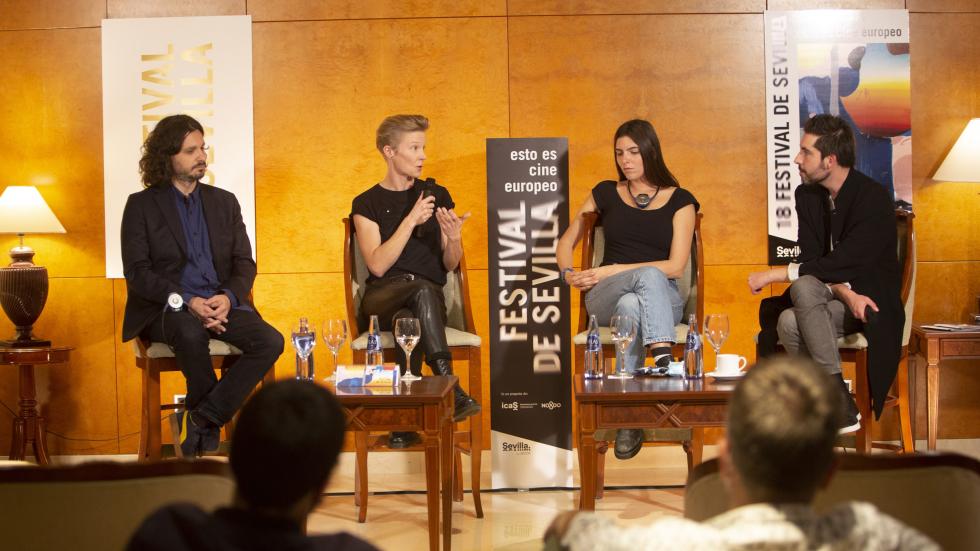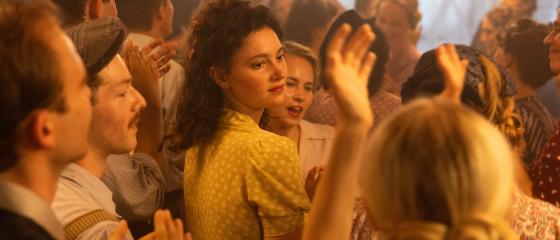Seville, 9 November 2021 - The directors of As far as i can walk, Stefan Arsenijević; Passion, Maja Borg and Moon, 66 questions, Jacqueline Lentzou took part this Tuesday in the fourth day of "A Coffee with...". Arsenijević's feature film was screened yesterday as part of the Extraordinary Stories section, it follows the dreams of two young Ghanaian women trapped in a refugee centre in Serbia. Borg's film, included in the New Waves Non-Fiction programme, explores religious rituals through discipline, domination, submission and sadism. Meanwhile, Lentzou's film is part of the New Waves SEFF ONLINE section and has been available on FILMIN since its national premiere last Monday in the cinemas of the Seville Festival. The film focuses on the life of Arthemis, a 24-year-old Greek woman who returns home to take care of her father after some time away.
A journey of transition
Director Jacqueline Lentzou's debut feature, Moon, 66 questions, is a tough and complex tale of what it is like for a young woman to take on the responsibility of caring for a father with Multiple Sclerosis. At the round table, the filmmaker explained that her work, although it is a search for the truth, "is full of a lot of literature and different scenarios that the spectator will discover". During this process, the filmmaker recalls that the actress Sofía Kokkali, with whom she already worked in her short film Hector Malot: The Last Day of the Year, Critics' Prize at Cannes in 2018, "at some point she stopped acting and started to be herself".
Lentzou added that although the aesthetics of the film were conditioned by a lack of time and money, "the filming gave us its own language". For this reason, "most of the shots are long takes and then in the editing we made the cuts". The real journey of Artemis, the protagonist's name, has nothing to do with her return home. "The adventure lies in getting to know her father so that he becomes part of her life," says the filmmaker. The feature film, despite dealing with such a tough subject as illness, includes touches of humour, which is also part of life.
The Relationship between Masochism and Christianity
For their part, Maja Borg, director of Passion, has pointed out that theirs is "a very personal film". After a toxic relationship, the Swedish artist decided to look for themselves by imagining the relationship between the queer community BDSM (Bondage, Discipline, Domination, Submission, Sadism and Masochism) and Christianity. For the filmmaker, both are practices that seek redemption, ecstasy and transcendence through rituals.
The characters in the film did not go through a casting process. "All the people in the film are people I have met on my filmmaking journey. I had a personal connection with the characters, and that was important because I needed that connection to make it," explains the artist. Instead, they wanted the creative process to be more intimate. "To create Passion we came up with a series of Christian and other BDSM ritual games that we integrated. I was looking for boundaries and limits and how to transgress those limits," concluded.
The stolen dreams of refugees
To end the panel, director Stefan Arsenijević spoke about his second feature film, As far I can walk, which arrives at the Seville Festival after winning the Crystal Globe at Karlovy Vary. His story follows Strahinya and Ababuo, two friends from Ghana who find themselves trapped in a refugee centre in Serbia. Unlike Borg’s, this was a very long casting. "It was the most difficult phase of the process because it took us almost a year to find actors from Europe and Africa. The result was very positive, because we have actors coming from different backgrounds and countries: Ibrahim Koma is from France, Nancy Mensah-Offei from Ghana, Maxim Khalil from Syria and Nebojša Dugalić from Serbia."
The director has explained that the film, although fiction, introduces elements of documentary. In fact, most of the figuration is real as they are part of Serbian refugee camps. "We were very free in the shooting. The cameraman was an expert in documentary filmmaking. Then the staging was improvised", says the filmmaker, who ended his speech by explaining that since most of the recorded work was real, afterwards, in the editing room, "we had a lot of work to do to fit the approaches properly".







